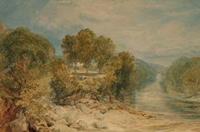Ruskin's Catalogue of Examples (1870)
Ruskin's first catalogue with notes containing his plans for the Standard, Reference and Educational series.

I went into my garden at half-past six this morning, April 21,1870, to think over the final order of these examples for you.
The air was perfectly calm, the sunlight pure, and falling on the grass through thickets of the standard peach (which has bloomed this year perfectly, owing to the wholesome restraint of protracted winter), and of plum and pear trees, in their first showers of fresh silver, looking more like much-broken and far-tossed spray of fountains than trees; and just at the end of my hawthorn walk, one happy nightingale was singing as much as he could in every moment. Meantime, in the still air, the roar of the railroads from Clapham Junction, New Cross, and the Crystal Palace (I am between the three), sounded constantly and heavily, like the surf of a strong sea three or four miles distant; and the whistles of the trains passing nearer mixed with the nightingale’s notes. That I could hear her at all, or see the blossoms, or the grass, in this best time of spring, depended on my having been long able to spend a large sum annually in self-indulgence, and in keeping my fellow-creatures out of my way. Of those who were causing all that murmur, like the sea, round me, and of the myriads imprisoned by the English Minotaur of lust for wealth, and condemned to live, if it is to be called life, in the labyrinth of black walls, and loathsome passages between them, which now fills the valley of the Thames, and is called London, not one could hear, this day, any happy bird sing, or look upon any quiet space of the pure grass that is good for seed.
But they might have the blessing of these things for all and each of them, if they chose, and that vast space of London might be full of gardens, and terraced round with hawthorn-walks, with children at play in them, as fair as their blossoms. Gentlemen, I tell you once more, unless you are minded to bring yourselves, and all whom you can help, out of this curse of darkness that has fallen on our hearts and thoughts, you need not try to do any art-work,—it is the vainest of affectations to try to put beauty into shadows, while all the real things that cast them are left in deformity and pain.




